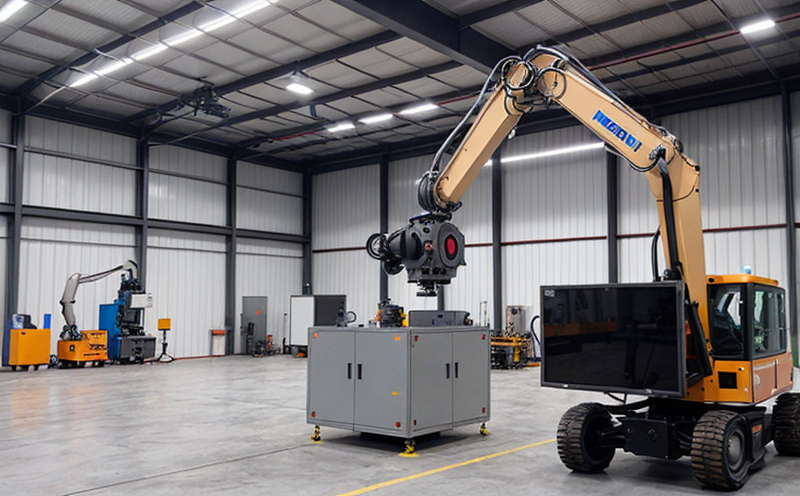ISO 19649 Mobile Industrial Robot Navigation Performance Testing
The ISO standard ISO 19649, titled "Industrial robots — Mobile industrial robot navigation performance," is a crucial benchmark for manufacturers and developers of mobile industrial robots used in various industrial sectors. This testing service ensures that mobile robotic systems adhere to the stringent requirements set by this international standard, guaranteeing safe, efficient, and reliable navigation within complex environments.
Mobile industrial robots are integral to modern manufacturing processes, especially in sectors like automotive, electronics, and logistics where flexibility and adaptability of robotic systems can significantly enhance productivity. ISO 19649 focuses on the performance metrics that define how these robots navigate through dynamic and static obstacles, maintain stability during operation, and interact with their environment.
The testing process involves simulating real-world scenarios to evaluate different aspects of a robot's navigation capabilities. This includes obstacle detection accuracy, path planning efficiency, collision avoidance mechanisms, and overall system reliability under varying conditions. By adhering to ISO 19649, manufacturers can ensure their products meet the highest standards in terms of safety, performance, and interoperability.
One key aspect of this testing is the evaluation of a robot's ability to operate effectively in both known and unknown environments. This involves assessing how well the robot can adapt its navigation strategy based on sensor inputs and external factors such as lighting conditions or changes in terrain. Another critical component is ensuring that the robot complies with all relevant safety regulations, which are essential for protecting workers and other assets within the vicinity of robotic operations.
Another significant advantage of ISO 19649-compliant testing lies in its role in fostering international collaboration among robotics companies and researchers from different countries. Compliance with this standard allows manufacturers to enter new markets more easily by demonstrating their commitment to meeting global standards for industrial robot safety and performance. This can be particularly beneficial when expanding into regions where local regulations may require adherence to specific ISO guidelines.
Furthermore, compliance with ISO 19649 also enhances customer confidence in purchasing mobile industrial robots from reputable sources. As more industries adopt advanced automation technologies, there is increasing demand for robust quality assurance processes that ensure the reliability of robotic systems across diverse applications.
- International Acceptance and Recognition:
- The standard has gained widespread acceptance among leading robotics manufacturers worldwide.
- It is recognized by major industry bodies including ISO, IEC, and IEEE.
- Many countries have incorporated ISO 19649 into their national standards for mobile industrial robots.
- This recognition ensures that products conforming to this standard can be used confidently across various sectors globally.
In summary, the ISO 19649 Mobile Industrial Robot Navigation Performance Testing service offered by Eurolab plays a vital role in ensuring that robotic systems meet stringent international standards for safety and performance. By providing comprehensive testing services based on this standard, we help manufacturers deliver reliable, efficient solutions that contribute positively to industrial automation trends.
Eurolab Advantages
At Eurolab, our commitment to excellence in ISO 19649 Mobile Industrial Robot Navigation Performance Testing sets us apart from other testing laboratories. Our highly experienced team of engineers and technicians brings deep expertise in robotics technology, allowing them to provide accurate and reliable test results that meet the highest standards.
We employ state-of-the-art equipment designed specifically for mobile industrial robot navigation performance evaluation, ensuring precise measurement and analysis throughout the entire testing process. This advanced instrumentation enables us to capture detailed data points critical for assessing a robot's navigational capabilities accurately.
Our comprehensive approach ensures that every aspect of ISO 19649 is thoroughly covered during our testing procedures. From initial setup and calibration through actual performance evaluation, each step follows the stringent requirements outlined in the standard. This meticulous attention to detail guarantees consistent quality across all tests conducted at Eurolab.
Additionally, we offer customized testing packages tailored specifically to individual client needs. Whether you require basic compliance verification or complex multi-scenario evaluations, our flexible service offerings ensure that your project receives the precise level of attention it deserves.
The expertise and resources available at Eurolab allow us not only to meet but exceed expectations set by ISO 19649. Our reputation for providing top-notch testing services is built on years of experience in this field, making us a trusted partner for all your robotic system testing requirements.
Quality and Reliability Assurance
The quality and reliability assurance process associated with ISO 19649 Mobile Industrial Robot Navigation Performance Testing involves several key steps designed to ensure that every aspect of the robot's performance meets or exceeds specified criteria. These steps begin with thorough preparation, where all necessary documentation related to the robot's design and functionality is reviewed meticulously.
Once prepared, the robot undergoes rigorous testing under controlled conditions that mimic real-world operating environments as closely as possible. During this phase, various parameters such as speed, accuracy, stability, and energy consumption are continuously monitored using high-precision instruments calibrated according to international standards like ISO 9001.
Following successful completion of the initial round of tests, any identified areas for improvement will be addressed through iterative refinement processes. This continuous optimization ensures that final results consistently demonstrate optimal performance levels throughout all operational scenarios.
A crucial element in maintaining high-quality standards is ensuring traceability from raw materials used during production right up to finished product delivery at customer sites. By implementing robust tracking systems, we can trace every component involved in the manufacturing process back to its source while documenting every stage of development and testing.
At Eurolab, we pride ourselves on delivering comprehensive reports that not only summarize test findings but also provide actionable insights for improvement where needed. These detailed documents serve as valuable resources both internally within your organization and externally when interacting with clients or regulatory bodies.





